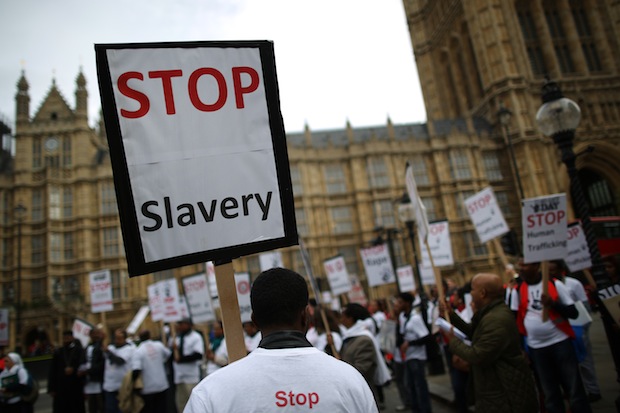[audioplayer src=”http://traffic.libsyn.com/spectator/TheViewFrom22_3_July_2014_v4.mp3″ title=”Frank Field and Isabel Hardman discuss the Modern Slavery Bill” startat=1865]
Listen
[/audioplayer]Who would have expected to find slavery on the outskirts of Cardiff? Not the locals, who were shocked when police carried out a raid while investigating the case of two men understood to have been held in captivity for 26 years. ‘Human trafficking is becoming more prevalent across the United Kingdom,’ said Gwent Police. That’s one way of putting it. Another is to say it has been prevalent for years, but the authorities are only now beginning to take notice.
The last government was more interested in apologising for the old form of slavery than recognising the new one. Tony Blair’s 2006 apology for the slave trade was all the more bizarre because Britain ended, rather than started, the business. Slavery is a worldwide phenomenon, controversial nowhere until the 18th century. Then a bunch of Christians in Clapham kicked up a fuss (with a similar movement in America) and William Wilberforce took up the cause. Britain outlawed the slave trade and the Royal Navy stamped it out.
But slavery has not been defeated. Men and women, girls and boys are still trapped, traded and forced into involuntary service as sex workers, labourers and sometimes soldiers. And it has taken a Conservative minister, Theresa May, to put slavery back on the agenda. Her Modern Slavery Bill, the sole redeeming feature of the recent Queen’s Speech, will again put Britain in the forefront of the fight against slavery by calling this evil by its name, identifying it properly, and equipping police and judges with the powers they need to fight it.
The problem until now has been that slaves are not always recognised as such, even when they arrive in a police station asking for help.








Comments
Join the debate for just £1 a month
Be part of the conversation with other Spectator readers by getting your first three months for £3.
UNLOCK ACCESS Just £1 a monthAlready a subscriber? Log in